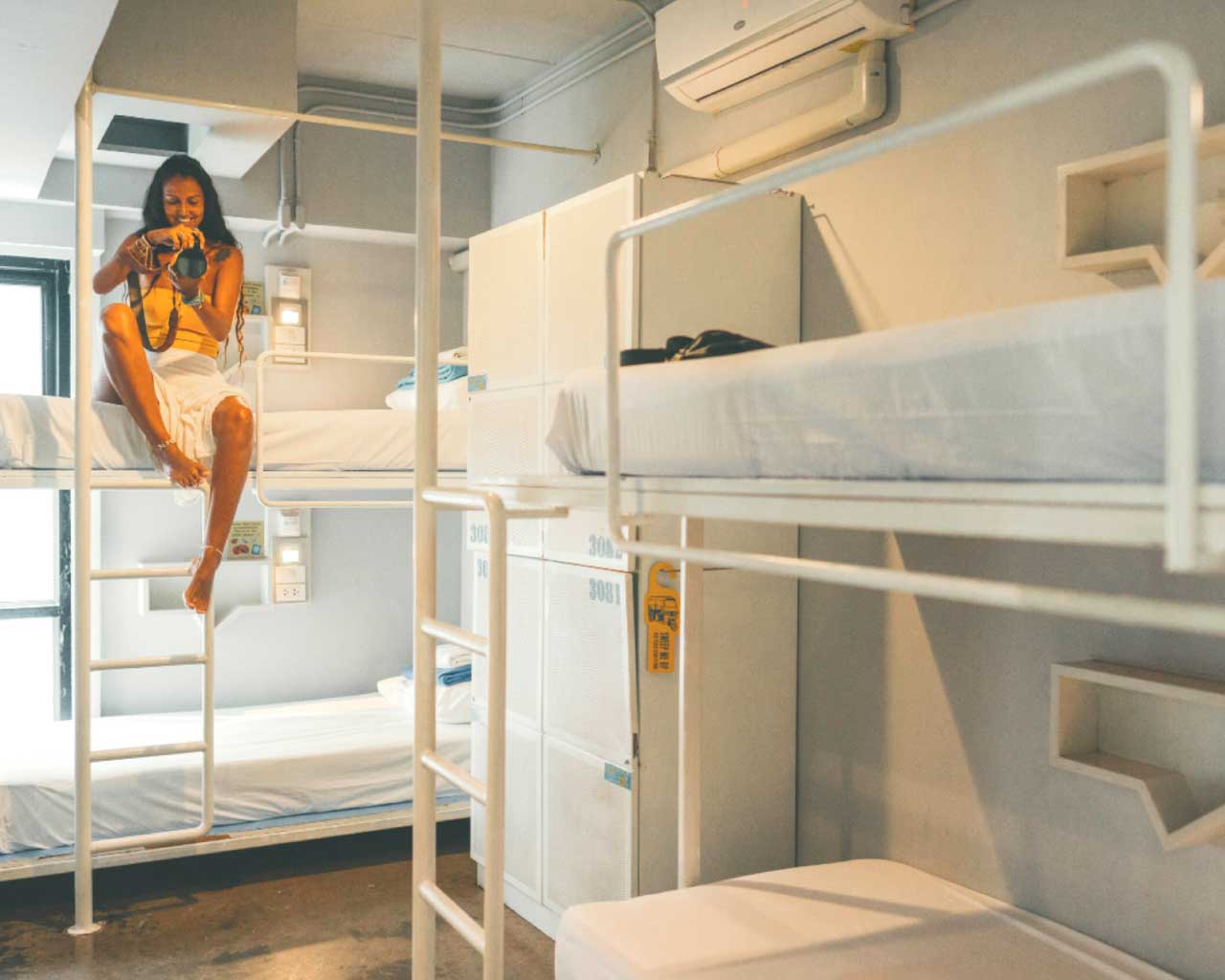Destinations

Your destination for incredible experiences.
Dive into local culture, take advantage of insider knowledge, and explore our locations in a way you never have before at Bangkok, Koh Samui, Phuket,
Siem Reap, Osaka and Manila’s best hotels.
Lub d Experience
Take the Plunge
Welcome to the new Lub d, your destination for incredible experiences. You didn't come for normal! This is the place to step out of your comfort zone and get to know your destination in ways you've never imagined.Promotions

Book Now, Pay Later
Did you know that we have "Book Now Pay Later" option? Let's plan your next "stress-free" holiday with us!
Dorm All Yours
Let's make the WHOLE DORM private just for you and your friends? Book Dorm All Yours!
Dorm All Yours
Let's make the WHOLE DORM private just for you and your friends? Book Dorm All Yours! (Ladies Only Dorm)
Book Now, Pay Later
Did you know that we have Book Now, Pay Later option? Let's plan your next stress-free holiday with us!
Stay Longer & Save (Room Only)
Stay at least 5 nights and we'll treat you to 25% off! The longer you stay, the more you save with us
Book Early & Save
Give us a heads up by booking in advance and earn up to 20% off
Book Now, Pay Later
Did you know that we have Book Now, Pay Later option? Let's plan your next stress-free holiday with us!
Book Now, Pay Later
Plan your next "stress-free" holiday with us plus daily breakfast! Book Now Pay Later (Room With Breakfast)
Book Now, Pay Later
Did you know that we have "Book Now Pay Later" option? Let's plan your next "stress-free" holiday with us!
Book Now, Pay Later
Did you know that we have "Book Now Pay Later" option? Let's plan your next "stress-free" holiday with us!
Dorm All Yours
Let's make the WHOLE DORM private just for you and your friends? Book Dorm All Yours!
Dorm All Yours
Let's make the WHOLE DORM private just for you and your friends? Book Dorm All Yours!
Dorm All Yours
Let's make the WHOLE DORM private just for you and your friends? Book Dorm All Yours!
Dorm All Yours
Let's make the WHOLE DORM private just for you and your friends? Book Dorm All Yours!
Dorm All Yours
Let's make the WHOLE DORM private just for you and your friends? Book Dorm All Yours! (Ladies Only Dorm)
Dorm All Yours
Let's make the WHOLE DORM private just for you and your friends? Book Dorm All Yours! (Ladies Only Dorm)
Dorm All Yours
Let's make the WHOLE DORM private just for you and your friends? Book Dorm All Yours! (Ladies Only Dorm)
Book Early & Save (Room With Breakfast)
Book early, save 15%! Enjoy a deal on your breakfast-included room and wake up to savings!
Book Early & Save (Room Only)
Give us a heads up by booking in advance and earn up to 15% off
Stay Longer & Save (Room Only)
2 nights aren't enough! Why don't you stay for at least 3 nights and save 10%? Let's explore more while saving more.
Book Early & Save (Room Only)
Give us a heads up by booking in advance and earn up to 15% off
Book Early & Save (Room with Breakfast)
Book early, save 15%! Enjoy a deal on your breakfast-included room and wake up to savings!
Stay Longer & Save (Room Only)
2 nights aren't enough! Why don't you stay for at least 3 nights and save 10%? Let's explore more while saving more.
Book Early & Save (Room Only)
Give us a heads up by booking in advance and earn up to 15% off
Stay Longer & Save (Room Only)
2 nights aren't enough! Why don't you stay for at least 3 nights and save 10%? Let's explore more while saving more.
Stay Longer & Save (Room Only)
2 nights aren't enough! Why don't you stay for at least 3 nights and save 10%? Let's explore more while saving more.
Book Early & Save (Room With Breakfast)
Book early, save 15%! Enjoy a deal on your breakfast-included room and wake up to savings!
Book Early & Save (Room Only)
Give us a heads up by booking in advance and earn up to 15% off
Stay Longer & Save (Room Only)
Stay at least 5 nights and we'll treat you to 20% off! The longer you stay, the more you save with us
Stay Longer & Save (Room with Breakfast)
Stay at least 3 nights instead of 2 and enjoy a 10% saving for a breakfast-included room. More adventures, more savings!
Stay Longer & Save (Room with Breakfast)
Stay at least 3 nights instead of 2 and enjoy a 10% saving for a breakfast-included room. More adventures, more savings!
Dorm All Yours
Let's make the WHOLE DORM private just for you and your friends? Book Dorm All Yours!
Book Now, Pay Later
Did you know that we have "Book Now Pay Later" option? Let's plan your next "stress-free" holiday with us!
Book Early & Save (Room Only)
Give us a heads up by booking in advance and earn up to 15% off
Stay Longer & Save (Room Only)
2 nights aren't enough! Why don't you stay for at least 3 nights and save 10%? Let's explore more while saving more.
Book Now, Pay Later (Room With Breakfast)
Did you know that we have Book Now, Pay Later option? Let's plan your next stress-free holiday with us!
Dorm All Yours
Let's make the WHOLE DORM private just for you and your friends? Book Dorm All Yours! (Ladies Only Dorm)
Dorm All Yours
Let's make the WHOLE DORM private just for you and your friends? Book Dorm All Yours!
Book Now, Pay Later
Did you know that we have Book Now, Pay Later option? Let's plan your next stress-free holiday with us!
Book Early & Save (Room Only)
Give us a heads up by booking in advance and earn up to 15% off
Book Early & Save (Room With Breakfast)
Book early, save 15%! Enjoy a deal on your breakfast-included room and wake up to savings!
Stay Longer & Save (Room Only)
Stay at least 5 nights and we'll treat you to 20% off! The longer you stay, the more you save with us
Stay Longer & Save (Room with Breakfast)
Stay at least 5 nights and we'll treat you to 20% off for breakfast-included room. Let's stay longer and save more
Stay Longer & Save (Room Only)
2 nights aren't enough! Why don't you stay for at least 3 nights and save 10%? Let's explore more while saving more
Stay Longer & Save (Room with Breakfast)
2 nights is not enough! Stay a minimum of 3 nights and save up to 15% off!
Book Now, Pay Later
Plan your next "stress-free" holiday with us plus daily breakfast! Book Now Pay Later (Room With Breakfast)
Dorm All Yours
Let's make the WHOLE DORM private just for you and your friends? Book Dorm All Yours! (Ladies Only Dorm)
Dorm All Yours
Let's make the WHOLE DORM private just for you and your friends? Book Dorm All Yours!
Book Now, Pay Later
Did you know that we have "Book Now Pay Later" option? Let's plan your next "stress-free" holiday with us!
Stay Longer & Save (Room With Breakfast)
Stay at least 5 nights and we'll treat you to 20% off for breakfast-included room. Let's stay longer and save more
Stay Longer & Save (Room Only)
Stay at least 5 nights and we'll treat you to 20% off! The longer you stay, the more you save with us
Stay Longer & Save (Room Only)
2 nights aren't enough! Why don't you stay for at least 3 nights and save 10%? Let's explore more while saving more.
Book Early & Save (Room With Breakfast)
Book early, save 15%! Enjoy a deal on your breakfast-included room and wake up to savings!
Book Early & Save (Room Only)
Give us a heads up by booking in advance and earn up to 15% off
Stay Longer & Save (Room with Breakfast)
Stay at least 3 nights instead of 2 and enjoy a 10% saving for a breakfast-included room. More adventures, more savings!
Book Now, Pay Later
Did you know that we have "Book Now Pay Later" option? Let's plan your next "stress-free" holiday with us!
Dorm All Yours
Let's make the WHOLE DORM private just for you and your friends? Book Dorm All Yours! (Ladies Only Dorm)
Dorm All Yours
Let's make the WHOLE DORM private just for you and your friends? Book Dorm All Yours!
Book Now, Pay Later
Plan your next "stress-free" holiday with us plus daily breakfast! Book Now Pay Later (Room With Breakfast)
Book Early & Save (Room Only)
Give us a heads up by booking in advance and earn up to 15% off
Book Early & Save (Room with Breakfast)
Book early, save 15%! Enjoy a deal on your breakfast-included room and wake up to savings!
Stay Longer & Save (Room Only)
2 nights aren't enough! Why don't you stay for at least 3 nights and save 10%? Let's explore more while saving more.
Stay Longer & Save (Room Only)
Stay at least 5 nights and we'll treat you to 20% off! The longer you stay, the more you save with us
Stay Longer & Save (Room with Breakfast)
Stay at least 5 nights and we'll treat you to 20% off for breakfast-included room. Let's stay longer and save more.
Stay Longer & Save (Room with Breakfast)
Stay at least 3 nights instead of 2 and enjoy a 10% saving for a breakfast-included room. More adventures, more savings!
Book Now, Pay Later
Plan your next "stress-free" holiday with us plus daily breakfast! Book Now Pay Later (Room With Breakfast)
Dorm All Yours
Let's make the WHOLE DORM private just for you and your friends? Book Dorm All Yours! (Ladies Only Dorm)
Dorm All Yours
Let's make the WHOLE DORM private just for you and your friends? Book Dorm All Yours!
Book Now, Pay Later
Did you know that we have Book Now, Pay Later option? Let's plan your next stress-free holiday with us!
Book Early & Save (Room Only)
Give us a heads up by booking in advance and earn up to 15% off
Book Early & Save (Room with Breakfast)
Book early, save 15%! Enjoy a deal on your breakfast-included room and wake up to savings!
Stay Longer & Save (Room With Breakfast)
Stay at least 5 nights and we'll treat you to 20% off for breakfast-included room. Let's stay longer and save more
Stay Longer & Save (Room Only)
Stay at least 5 nights and we'll treat you to 20% off! The longer you stay, the more you save with us
Stay Longer & Save (Room Only)
2 nights aren't enough! Why don't you stay for at least 3 nights and save 10%? Let's explore more while saving more.
Stay Longer & Save (Room with Breakfast)
Stay at least 3 nights instead of 2 and enjoy a 10% saving for a breakfast-included room. More adventures, more savings!
Stay Longer & Save (Room Only)
2 nights aren't enough! Why don't you stay for at least 3 nights and save 15%? Let's explore more while saving more
Book Early & Save
Give us a heads up by booking in advance and earn up to 20% off
Stay Longer & Save (Room Only)
Stay at least 5 nights and we'll treat you to 25% off! The longer you stay, the more you save with us
Book Now, Pay Later
Did you know that we have "Book Now Pay Later" option? Let's plan your next "stress-free" holiday with us!What our guests say
#lubdexperienceFeatures
Take a wrong turn
Book your stay right in the heart of buzzing destinations across Southeast Asia! Whenever you are looking for a comfortable accomodation in Bangkok, Koh Samui, Siem Reap or Makati, Lub d is the place to begin your journey. And, stay tuned for our freshly and newly renovated Lub d Phuket in Patong beach.
Take a plunge into the local culture, create new and inspiring friendships, check out the local delights, and engage in the zestful activities around you.
Relax in Style and Comfort
Choose your favorite Private or Dorm room that matches your lifestyle, whether you are a solo traveler, rolling with big groups of friends or traveling with a family.
Let’s fuel up your body with our breakfast after a night out, or simply catch up with friends in the evening at District in Bangkok. Or, enjoy the delish and beach vibes at Tropics Bar in Koh Samui.
Location, Location, Location
Our hotels are located in vibrant and prime locations for all the travelers to explore and soak up the memorable experiences!
Strolling around Siam Square or Poblacion while checking out their world-famous street food, learning and observing the cultural areas of temples in Siem Reap or shopping at the famous shopping scenes are all possible. It’s your call!
We are not just only about the cities, our Lub d also provides a beachy getaway on one of the most beautiful beaches in Samui and Phuket for you to chill and have fun to the max. Stay bold and start your adventure with Lub d!









